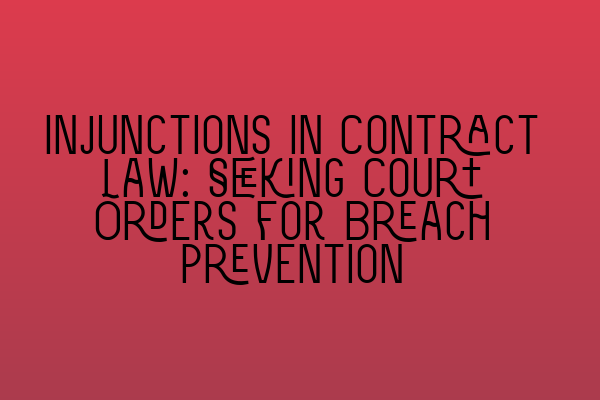Injunctions in Contract Law: Seeking Court Orders for Breach Prevention
Welcome to our blog, where we explore the fascinating world of contract law. In this post, we will be discussing injunctions and how they can be utilized as a powerful tool for preventing breach of contract. If you’re a solicitor, barrister, or even just an enthusiast of the legal profession, this article is for you. We’ll dive deep into the topic and provide valuable insights that will help you navigate the complex landscape of injunctions in contract law.
What is an Injunction?
Before we delve into the specifics of injunctions in contract law, let’s first define what an injunction is. An injunction is a court order that legally compels a party to either do something or refrain from doing something. It is a powerful remedy that can be sought in cases where immediate action is necessary to prevent irreparable harm or to preserve the status quo.
In contract law, injunctions are commonly sought to prevent a party from breaching their contractual obligations. This can include actions such as disclosing sensitive information, competing with the other party, or engaging in activities that violate the terms of the agreement. By obtaining an injunction, the aggrieved party can ensure that the contract is upheld and their rights are protected.
Types of Injunctions
There are two main types of injunctions that can be sought in contract law cases:
- Prohibitory Injunction: This type of injunction prohibits a party from taking a certain action. For example, if a company has entered into a non-disclosure agreement with an employee and suspects that they might leak confidential information, they can seek a prohibitory injunction to prevent the employee from disclosing the information.
- Mandatory Injunction: On the other hand, a mandatory injunction compels a party to take a specific action. In contract law, this is often sought when a party fails to perform their contractual obligations. For instance, if a contractor fails to complete a construction project by the agreed-upon deadline, the client can seek a mandatory injunction to force the contractor to fulfill their obligations within a specified timeframe.
Both types of injunctions can play a crucial role in preventing breaches of contract and ensuring that parties fulfill their obligations. Seeking the appropriate type of injunction depends on the specific circumstances of the case and the desired outcome.
The Legal Criteria for Obtaining an Injunction
Obtaining an injunction is not an automatic right. The party seeking the injunction must meet specific legal criteria to convince the court that the injunction is warranted. While the exact criteria may vary depending on the jurisdiction, some general principles apply. These include:
- Irreparable Harm: The party seeking the injunction must demonstrate that they will suffer irreparable harm if the injunction is not granted. This means that monetary compensation alone would not be sufficient to remedy the damage caused by the breach.
- Balance of Convenience: The court will consider the balance of convenience in deciding whether to grant the injunction. This involves determining which party would suffer greater harm if the injunction is or is not granted. The court will strive to minimize harm and maintain the status quo as much as possible.
- Strong Likelihood of Success: The party seeking the injunction must show a strong likelihood of success in proving their case. This entails demonstrating that there is a valid contract in place and that the other party has breached, or is likely to breach, its terms.
- No Adequate Remedy: Finally, the party seeking the injunction must show that there is no other adequate remedy available. If there are alternative ways to resolve the dispute, the court may be less inclined to grant an injunction.
Meeting these criteria is essential for obtaining an injunction and preventing breaches of contract. It is crucial for solicitors and legal professionals to thoroughly analyze the case and gather strong evidence to support their application.
Benefits and Limitations of Injunctions
Seeking an injunction in contract law cases can offer several benefits for the aggrieved party. Some of these benefits include:
- Preserving the Status Quo: Injunctions help maintain the status quo and prevent further harm or breaches of contract.
- Protection of Rights: Injunctions are an effective way to protect the rights and interests of the aggrieved party, ensuring that their contractual obligations are upheld.
- Speedy Resolution: Injunctions can expedite the resolution of disputes by providing immediate relief to the aggrieved party.
However, it is important to note that injunctions also have their limitations. They are a discretionary remedy granted by the court, and there is no guarantee that an injunction will be granted in every case. Additionally, seeking an injunction can be a complex and costly process, requiring the assistance of experienced solicitors.
Conclusion
Injunctions are a valuable tool in contract law for preventing breaches of contract and preserving the rights of parties. Whether it is a prohibitory injunction to prevent disclosure of confidential information or a mandatory injunction to compel performance of contractual obligations, seeking an injunction can be a powerful strategy for solicitors and legal professionals.
If you found this article helpful, be sure to check out our related articles:
- Navigating Legal Challenges and Pitfalls in Your Practice
- Barrister vs. Solicitor: A Comprehensive Comparison
- Understanding the SRA Competence Statement: A Guide for Solicitors
- Exploring Different Solicitor Specializations: Finding Your Niche
- Top Recommendations for Law Schools in the UK
Stay tuned for more informative articles on contract law and further enhance your expertise in the field. If you have any questions or would like to learn more about our services at SQE Contract Law, please don’t hesitate to contact us.
